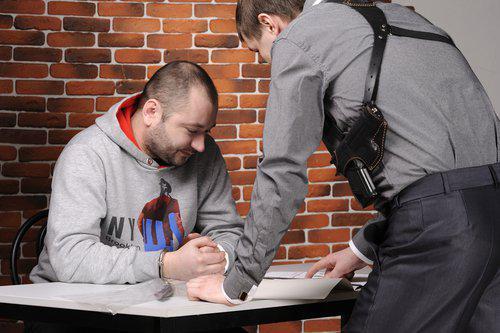Recent Blog Posts
Changes to Wisconsin’s Sexual Assault Laws Could Be on the Way
 Current law defines sexual assault (at minimum) as any intentional, non-consensual sexual touching of intimate parts, directly or through clothing, for the purpose of sexual gratification or victim humiliation. Some lawmakers are looking to make changes to that law that would greatly alter the definition of touching. It would also further restrict who is allowed to give consent in any given situation.
Current law defines sexual assault (at minimum) as any intentional, non-consensual sexual touching of intimate parts, directly or through clothing, for the purpose of sexual gratification or victim humiliation. Some lawmakers are looking to make changes to that law that would greatly alter the definition of touching. It would also further restrict who is allowed to give consent in any given situation.
In tandem to those proposed changes, lawmakers in Wisconsin recently introduced a new bill that is designed to provide protections to underage assault victims. Both measures are intended to mostly target college campus and high school sexual assault crimes, but the implications have a much wider net with a penalty that could impose charges, even if no intent exists.
Affirmative Consent, Touching, and the Physically Disabled
How Often Do Wrongful Arrests, Convictions, and Imprisonment Occur?
 While most of us would like to believe that wrongful convictions are rare, the real truth is that they are more common than most people realize. Steven Avery, who spent 18 years in jail for a rape he did not commit, and a San Francisco man who spent six years in jail while awaiting trial for a violent mugging that he never did are just two people wronged by our justice system. But they are many. They are also largely unpublicized and undisclosed to the general public.
While most of us would like to believe that wrongful convictions are rare, the real truth is that they are more common than most people realize. Steven Avery, who spent 18 years in jail for a rape he did not commit, and a San Francisco man who spent six years in jail while awaiting trial for a violent mugging that he never did are just two people wronged by our justice system. But they are many. They are also largely unpublicized and undisclosed to the general public.
Study Estimates More than 10,000 Innocent People Are Convicted Each Year
A recent study asked 188 judges, state attorneys general, prosecuting attorneys, public defenders, police chiefs, and sheriffs to estimate the prevalence of wrongful conviction in the United States. Approximately 72 percent of them estimated that less than one percent, but more than zero, received a wrongful conviction.
Understanding the Implications of a Hate Crime
 Hate crimes are criminal acts committed because of someone’s race, religion, ethnicity, sexual orientation, gender, gender identity, or disability. Charged and tried according to state statutes, most carry a “penalty enhancement” clause that increases the weight of a penalty. The federal government may also become involved in the investigation or prosecution of a potential hate crime. If you are facing charges for a hate crime, or are at risk for facing such charges, it is important that you understand the possible implications of a potential conviction.
Hate Crime Charges in Wisconsin
According to Wisconsin state law, hate crimes that would have originally resulted in a misdemeanor charge (other than Class A) have an increased penalty of up to one year in a county jail and a maximum fine of $10,000. Hate crimes that would have originally classified as Class A misdemeanors may result in a maximum of two years of imprisonment and an increased fine of $10,000. For hate crimes that would have been classified as a felony, the maximum fine may not be increased by more than $5,000, but the imprisonment term can be increased by as many as five extra years of imprisonment.
FBI Involvement
Although, typically, hate crimes are not considered federal offenses, the federal government can and sometimes will aid in the investigation and prosecution of a hate crime. Covered under the Matthew Shepard and James Byrd, Jr. Hate Crimes Prevention Act, this involvement can include (but is not limited to) investigative activities, law enforcement support to state agencies, and even federal prosecution if the state is unwilling or incapable of moving forward with a hate crime prosecution.
Not All Crimes against Target Groups Are Hate Crimes
A crime against someone within a target group is not necessarily a hate crime because bias does not always play a role. If, however, there is any evidence to suggest that you may have committed a crime because of someone’s race, religion, ethnicity, sexual orientation, gender, gender identity, or disability, it could be added to your charges, regardless of your intent. This, paired with the potential increase of punishment, makes the procurement of qualified legal representation critical for anyone who is facing charges over a crime against a target group.
Hate crimes are criminal acts committed because of someone’s race, religion, ethnicity, sexual orientation, gender, gender identity, or disability. Charged and tried according to state statutes, most carry a “penalty enhancement” clause that increases the weight of a penalty. The federal government may also become involved in the investigation or prosecution of a potential hate crime. If you are facing charges for a hate crime, or are at risk for facing such charges, it is important that you understand the possible implications of a potential conviction.
Hate Crime Charges in Wisconsin
According to Wisconsin state law, hate crimes that would have originally resulted in a misdemeanor charge (other than Class A) have an increased penalty of up to one year in a county jail and a maximum fine of $10,000. Hate crimes that would have originally classified as Class A misdemeanors may result in a maximum of two years of imprisonment and an increased fine of $10,000. For hate crimes that would have been classified as a felony, the maximum fine may not be increased by more than $5,000, but the imprisonment term can be increased by as many as five extra years of imprisonment.
FBI Involvement
Although, typically, hate crimes are not considered federal offenses, the federal government can and sometimes will aid in the investigation and prosecution of a hate crime. Covered under the Matthew Shepard and James Byrd, Jr. Hate Crimes Prevention Act, this involvement can include (but is not limited to) investigative activities, law enforcement support to state agencies, and even federal prosecution if the state is unwilling or incapable of moving forward with a hate crime prosecution.
Not All Crimes against Target Groups Are Hate Crimes
A crime against someone within a target group is not necessarily a hate crime because bias does not always play a role. If, however, there is any evidence to suggest that you may have committed a crime because of someone’s race, religion, ethnicity, sexual orientation, gender, gender identity, or disability, it could be added to your charges, regardless of your intent. This, paired with the potential increase of punishment, makes the procurement of qualified legal representation critical for anyone who is facing charges over a crime against a target group.
The skilled Milwaukee criminal defense attorneys of Gimbel, Reilly, Guerin & Brown, LLP, offer more than 40 years of experience to your criminal case. Comprised of a team that has experience on both sides of the law, our attorneys are capable of doing more than just protecting your rights; they know what it takes to build a solid defense for you. Schedule your consultation by calling our offices at 414-271-1440 today.
Basics of the Criminal Process for a Felony
 If you have been charged with a felony in Wisconsin, you will find yourself in the middle of a complex criminal justice system. The better you understand what you are facing the better decisions you can make and the more help you will be to your lawyer
If you have been charged with a felony in Wisconsin, you will find yourself in the middle of a complex criminal justice system. The better you understand what you are facing the better decisions you can make and the more help you will be to your lawyer
Investigation
Criminal cases start out with some type of investigation. The investigation may be triggered by a 911 call or by non-emergency reports of wrongdoing to law enforcement personnel. Initially, you may not even know you are being investigated. Often, law enforcement personnel will want to question you or search your property as part of their investigation. If law enforcement personnel are interested in speaking with you, it is in your best interest to speak with a lawyer first. Arrest The investigation may take a few hours, or a few weeks or months. Once law enforcement personnel believe they have probable cause that you have committed a crime, you will be arrested. Sometimes after an arrest, law enforcement personnel want to speak with you about your case. You have the right to ask for a lawyer and otherwise should remain silent. Bail Hearing Typically, the first hearing will be a bail hearing. You will be brought before a judge and the judge will set the bail amount. If you make bail and follow the conditions of your release agreement, you can remain out of custody as your case moves forward. Preliminary Hearing In a felony case, you have a right to a preliminary hearing you can waive that right if you choose. At a preliminary hearing, both the prosecutor and the defense lawyers will present part of their case to the judge. The judge must decide if there is probable cause to believe you committed the crime for the case to move forward. Arraignment After a preliminary hearing, you will be arraigned. This means that formal charges are presented and a plea of guilty or not guilty will be entered. If a plea of guilty is entered, a trial date will be set.Pretrial Hearings
Your Right to Remain Silent: A Good Criminal Defense Starts with You
 Some people mistakenly believe that their criminal defense starts after getting arrested. However, if you understand your rights, your potential defenses will start when you first come in contact with law enforcement. One of the most important rights to understand is your right to remain silent.
Some people mistakenly believe that their criminal defense starts after getting arrested. However, if you understand your rights, your potential defenses will start when you first come in contact with law enforcement. One of the most important rights to understand is your right to remain silent.
The Right to Remain Silent and the Constitution
The phrase “the right to remain silent” is not in the U.S. Constitution. Instead this right comes from the aftermath of a Supreme Court case called Miranda v. Arizona. In this case the Supreme Court held that law enforcement had a duty to inform people who were under arrest about their constitutional rights. The right to remain silent refers to the right not to be compelled to incriminate yourself. The Fifth Amendment prohibits police from forcing a confession.
Lifetime GPS Monitoring of Convicted Felon Upheld in Federal Appeals Court
 GPS monitoring is often used when a criminal defendant is out on bail, or when someone who has been convicted of a crime is on probation or other provisions of release require it. In Wisconsin, that law extends to convicted sex offenders, who must wear the GPS tracking devices for the rest of their lives. One man recently attempted to have this mandate overturned, but his request was denied in federal appeals court. Wisconsin’s GPS Laws on Sex Offenders In 2006, Wisconsin enacted a law that allowed any convicted sex offender who completed their prison term and finished 20 years of monitoring to apply to have their GPS tracking bracelet removed. However, those who have prison terms followed by civil commitment under the Chapter 980 law must wear the bracelet for life. Although this particular portion of the law has garnered a great deal of criticism from advocates that find it cruel, unnecessary, and excessive, the recent ruling suggests that it is unlikely to be amended any time soon. Why a Skilled Criminal Defense Attorney Is Critical for Sex Offense Crimes in Wisconsin Sexual offense charges in any state are considered especially heinous crimes and they often result in lengthy sentences and extreme measures like the lifetime GPS tracking device. Those facing charges are often stigmatized, even before they reach a courtroom. A skilled and experienced criminal defense attorney can protect your rights and ensure you receive the fair trial you deserve. Gimbel, Reilly, Guerin & Brown, LLP has been serving the Wisconsin area since 1968. Committed to providing you with the legal representation you deserve, our attorneys will work hard to help you reach the best possible outcome for your unique situation. To learn more about our award-winning services, schedule your consultation with our skilled Milwaukee criminal defense attorneys. Call 414-271-1440 today.
GPS monitoring is often used when a criminal defendant is out on bail, or when someone who has been convicted of a crime is on probation or other provisions of release require it. In Wisconsin, that law extends to convicted sex offenders, who must wear the GPS tracking devices for the rest of their lives. One man recently attempted to have this mandate overturned, but his request was denied in federal appeals court. Wisconsin’s GPS Laws on Sex Offenders In 2006, Wisconsin enacted a law that allowed any convicted sex offender who completed their prison term and finished 20 years of monitoring to apply to have their GPS tracking bracelet removed. However, those who have prison terms followed by civil commitment under the Chapter 980 law must wear the bracelet for life. Although this particular portion of the law has garnered a great deal of criticism from advocates that find it cruel, unnecessary, and excessive, the recent ruling suggests that it is unlikely to be amended any time soon. Why a Skilled Criminal Defense Attorney Is Critical for Sex Offense Crimes in Wisconsin Sexual offense charges in any state are considered especially heinous crimes and they often result in lengthy sentences and extreme measures like the lifetime GPS tracking device. Those facing charges are often stigmatized, even before they reach a courtroom. A skilled and experienced criminal defense attorney can protect your rights and ensure you receive the fair trial you deserve. Gimbel, Reilly, Guerin & Brown, LLP has been serving the Wisconsin area since 1968. Committed to providing you with the legal representation you deserve, our attorneys will work hard to help you reach the best possible outcome for your unique situation. To learn more about our award-winning services, schedule your consultation with our skilled Milwaukee criminal defense attorneys. Call 414-271-1440 today.
Trickery, Baiting, Suggestibility and Lies – Interrogation Tactics Described in the Netflix Series “Making A Murderer” Are Not Uncommon
 Since the airing of the 10-episode Netflix documentary, “Making a Murderer” began in January 2016, the cases of Steven Avery and Brendan Dassey have drawn a considerable amount of attention from the public and the media around the United States. Many are both surprised and outraged by the details of Avery’s original wrongful conviction, and some believe there may be evidence that Avery was again wrongfully accused and convicted of a horrendous crime.
Although less discussed, Mr. Dassey’s related case has also drawn scrutiny from the public, particularly for the way he was interrogated by police. But what many people may not realize is that these practices – lying, baiting, suggestibility and trickery - are actually quite common during police interrogations. Moreover, courts often give their approval or a wink-wink to these kinds of tactics, deeming the confessions obtained through deception admissible as evidence.
Deception and Trickery During Interrogation Can Be Permissible
Practices such as strategic deception (lying to push for a confession or information), trickery, baiting (telling suspects they have evidence they do not have), “good cop, bad cop” routines, suggesting that there is forensic evidence or another person’s confession that clearly implicates the suspect undergoing questioning, along with other forms of deception are not only permitted during police interrogations, they are often considered “harmless error” even if it leads to a confession that seals the prosecution’s case. Atty. Ray Dall’Osto provided further comment on the import of this for Mr. Dassey’s case in a January 2016 newspaper interview, which can be found at this link.
Of course, there have been times that law enforcement officers’ tactics in obtaining confessions have been held to have gone too far, but the instances are rare. This is due, in part, to the murky line between coercion and “acceptable” deception. There is no bright line rule that says how far is “too far.” That is why it is essential to have experienced criminal defense counsel who can effectively challenge the admissibility of confessions and suppress them as evidence.
Did Investigators Go Too Far?
If no hard line exists, it becomes the court’s discretion as to whether or not a suspect’s rights have been violated; and that can create a very slippery slope. Take, for example, Brendan Dassey’s interrogation which is addressed in the Netflix series. Law enforcement officers are allowed to interrogate a minor without parental consent, but concerns exist about the ability of the minor, young person or person with special needs to understand and properly waive their important constitutional rights to remain silent and to an attorney.
Mr. Dassey’s low IQ, the way police misled him in their questioning and the way he seemed to be guessing at the answers calls the reliability of the interrogation into question. Yet that evidence (which was the chief piece of evidence to actually tie Dassey to the murder) was found admissible. In light of the Netflix series, there has arisen a public concern that this should not have been and that, at the very least, Mr. Dassey deserves a new trial.
Causes of Wrongful Convictions
The National Innocence Project has put together the chart below on the principle contributing causes of wrongful convictions, based on actual cases handled and exoneratons obtained.
Since the airing of the 10-episode Netflix documentary, “Making a Murderer” began in January 2016, the cases of Steven Avery and Brendan Dassey have drawn a considerable amount of attention from the public and the media around the United States. Many are both surprised and outraged by the details of Avery’s original wrongful conviction, and some believe there may be evidence that Avery was again wrongfully accused and convicted of a horrendous crime.
Although less discussed, Mr. Dassey’s related case has also drawn scrutiny from the public, particularly for the way he was interrogated by police. But what many people may not realize is that these practices – lying, baiting, suggestibility and trickery - are actually quite common during police interrogations. Moreover, courts often give their approval or a wink-wink to these kinds of tactics, deeming the confessions obtained through deception admissible as evidence.
Deception and Trickery During Interrogation Can Be Permissible
Practices such as strategic deception (lying to push for a confession or information), trickery, baiting (telling suspects they have evidence they do not have), “good cop, bad cop” routines, suggesting that there is forensic evidence or another person’s confession that clearly implicates the suspect undergoing questioning, along with other forms of deception are not only permitted during police interrogations, they are often considered “harmless error” even if it leads to a confession that seals the prosecution’s case. Atty. Ray Dall’Osto provided further comment on the import of this for Mr. Dassey’s case in a January 2016 newspaper interview, which can be found at this link.
Of course, there have been times that law enforcement officers’ tactics in obtaining confessions have been held to have gone too far, but the instances are rare. This is due, in part, to the murky line between coercion and “acceptable” deception. There is no bright line rule that says how far is “too far.” That is why it is essential to have experienced criminal defense counsel who can effectively challenge the admissibility of confessions and suppress them as evidence.
Did Investigators Go Too Far?
If no hard line exists, it becomes the court’s discretion as to whether or not a suspect’s rights have been violated; and that can create a very slippery slope. Take, for example, Brendan Dassey’s interrogation which is addressed in the Netflix series. Law enforcement officers are allowed to interrogate a minor without parental consent, but concerns exist about the ability of the minor, young person or person with special needs to understand and properly waive their important constitutional rights to remain silent and to an attorney.
Mr. Dassey’s low IQ, the way police misled him in their questioning and the way he seemed to be guessing at the answers calls the reliability of the interrogation into question. Yet that evidence (which was the chief piece of evidence to actually tie Dassey to the murder) was found admissible. In light of the Netflix series, there has arisen a public concern that this should not have been and that, at the very least, Mr. Dassey deserves a new trial.
Causes of Wrongful Convictions
The National Innocence Project has put together the chart below on the principle contributing causes of wrongful convictions, based on actual cases handled and exoneratons obtained.
Why Are Homicide Rates up in Milwaukee?
 In 2015, 160 people were killed in the city of Milwaukee, this is the highest number of homicides since the early nineties. This number is alarming to city and state officials, especially after there were only 86 homicide victims in Milwaukee in 2014, the lowest number the city had seen in years. This 69 percent increase in homicides is a larger increase than cities like St. Louis, Washington D.C., and Baltimore, which all received media attention due to homicide rates. Now, city and state officials are wondering what has caused the increase.
In 2015, 160 people were killed in the city of Milwaukee, this is the highest number of homicides since the early nineties. This number is alarming to city and state officials, especially after there were only 86 homicide victims in Milwaukee in 2014, the lowest number the city had seen in years. This 69 percent increase in homicides is a larger increase than cities like St. Louis, Washington D.C., and Baltimore, which all received media attention due to homicide rates. Now, city and state officials are wondering what has caused the increase.
Why the Increase in Homicides?
“That is the million-dollar question,” says a leader of the Milwaukee Homicide Review Commission, an organization that studies homicides and incidents of gun violence in Milwaukee. Many trends in the city have remained constant. A majority of the victims were African-American men. Most of the victims were shot to death. Some victims were related. What exactly caused the dramatic increase in homicide this past year remains somewhat of a mystery. There are many different theories that have been discussed. Some Milwaukee residents say the problem stems from poverty. Some say segregation is the issue. Other reasons cited are easily accessible firearms, too much policing, or police are not doing enough.
Framed by a Fly: Forensic Scientist Says Flies Are Capable of Transporting DNA Evidence
 Inside a courtroom, and to a jury, a DNA sample almost always seals the case against an alleged criminal; it would seem appropriate, considering how the odds of a false identification is lower than one in 10 million. But real and valid cases of DNA contamination - from the “trace” DNA samples that can be transferred by a mere handshake, to a single intact sperm inadvertently finding its way onto a slide containing a woman’s vaginal secretions – suggest that our reliance on DNA evidence has become more than slightly concerning.
Inside a courtroom, and to a jury, a DNA sample almost always seals the case against an alleged criminal; it would seem appropriate, considering how the odds of a false identification is lower than one in 10 million. But real and valid cases of DNA contamination - from the “trace” DNA samples that can be transferred by a mere handshake, to a single intact sperm inadvertently finding its way onto a slide containing a woman’s vaginal secretions – suggest that our reliance on DNA evidence has become more than slightly concerning.
DNA Evidence – Then and Now
When DNA analysis first emerged, a decent amount of evidence was needed to extract just a partial profile (think a blood stain the size of a quarter). But, as modern science has improved, the sample of DNA needed to supply incriminating evidence has decreased exponentially. Today, an entire profile can be created with a sample the size of a pinhead. Unfortunately, that improvement has come at a price; and quite often that price is the wrongful conviction of an innocent person.
Sudden Infant Death Syndrome and the Charges Parents May Face
 Each year, more than 3,500 children die of Sudden Infant Death Syndrome (SIDS), which is the sudden death of an infant that cannot be explained after a thorough investigation. So much about what causes SIDS is still unknown. The cause of many SIDS deaths remains a mystery. Unfortunately, some SIDS deaths end up resulting in criminal charges for parents or caretakers, compounding tragedy on top of tragedy.
Each year, more than 3,500 children die of Sudden Infant Death Syndrome (SIDS), which is the sudden death of an infant that cannot be explained after a thorough investigation. So much about what causes SIDS is still unknown. The cause of many SIDS deaths remains a mystery. Unfortunately, some SIDS deaths end up resulting in criminal charges for parents or caretakers, compounding tragedy on top of tragedy.
Mother Convicted of Manslaughter
In 2014, a North Virginia mother swaddled her baby, placed him face down on a couch cushion, and then fell asleep herself. When she awoke, she found her baby boy unconscious. Just a couple months later, the mother was arrested on charges of manslaughter. She eventually plead guilty to those charges and was ordered to complete three years of probation or face five years of imprisonment. Cases relating to criminal charges from SIDS involve parents and/or caregivers failing to follow safe sleep practices, such as giving the baby its own sleeping space or placing the baby on its back to sleep. Other cases involve parents/caregivers who seem to have done everything possible to reduce the risk to their babies. Yet in rare circumstances, they, too, have faced charges. The stress and trauma of having to endure such charges in the midst of such a great and unpreventable loss is undoubtedly devastating.








